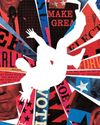
If you ever have to lie about your age, try to do it with as much creativity and conviction as Tennessee Williams. When he was nearly twenty-eight, the playwright submitted a handful of one-act plays to a contest for writers under twenty-five. Worried that his deception would be discovered, he changed his name and mailed the submission not from St. Louis, where he lived, but from Memphis, using his grandparents' home there as the return address. Born Thomas Lanier Williams III in Mississippi, he first considered calling himself Valentine Sevier, after an ancestor on his father's side whose brother was the first governor of Tennessee. But he decided to instead keep his last name and change only his first.
"Mr. "Tennessee' Williams got a telegram last night," he wrote to his mother a few months later, in March, 1939, letting her know that he'd won the contest, receiving a hundred-dollar prize from the Group Theatre, in New York City. "Do not spread this around till the checque has arrived, as some of my friends'... might feel morally obliged to inform the Group that I am over 25."
Denne historien er fra July 10 - 17, 2023 (Double Issue)-utgaven av The New Yorker.
Start din 7-dagers gratis prøveperiode på Magzter GOLD for å få tilgang til tusenvis av utvalgte premiumhistorier og 9000+ magasiner og aviser.
Allerede abonnent ? Logg på
Denne historien er fra July 10 - 17, 2023 (Double Issue)-utgaven av The New Yorker.
Start din 7-dagers gratis prøveperiode på Magzter GOLD for å få tilgang til tusenvis av utvalgte premiumhistorier og 9000+ magasiner og aviser.
Allerede abonnent? Logg på

YULE RULES
“Christmas Eve in Miller’s Point.”

COLLISION COURSE
In Devika Rege’ first novel, India enters a troubling new era.

NEW CHAPTER
Is the twentieth-century novel a genre unto itself?

STUCK ON YOU
Pain and pleasure at a tattoo convention.

HEAVY SNOW HAN KANG
Kyungha-ya. That was the entirety of Inseon’s message: my name.

REPRISE
Reckoning with Donald Trump's return to power.

WHAT'S YOUR PARENTING-FAILURE STYLE?
Whether you’re horrifying your teen with nauseating sex-ed analogies or watching TikToks while your toddler eats a bagel from the subway floor, face it: you’re flailing in the vast chasm of your child’s relentless needs.

COLOR INSTINCT
Jadé Fadojutimi, a British painter, sees the world through a prism.

THE FAMILY PLAN
The pro-life movement’ new playbook.

President for Sale - A survey of today's political ads.
On a mid-October Sunday not long ago sun high, wind cool-I was in Harrisburg, Pennsylvania, for a book festival, and I took a stroll. There were few people on the streets-like the population of a lot of capital cities, Harrisburg's swells on weekdays with lawyers and lobbyists and legislative staffers, and dwindles on the weekends. But, on the façades of small businesses and in the doorways of private homes, I could see evidence of political activity. Across from the sparkling Susquehanna River, there was a row of Democratic lawn signs: Malcolm Kenyatta for auditor general, Bob Casey for U.S. Senate, and, most important, in white letters atop a periwinkle not unlike that of the sky, Kamala Harris for President.